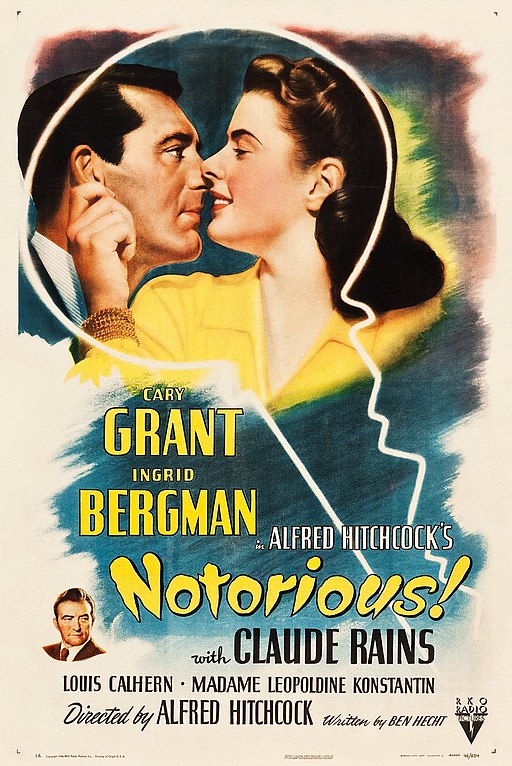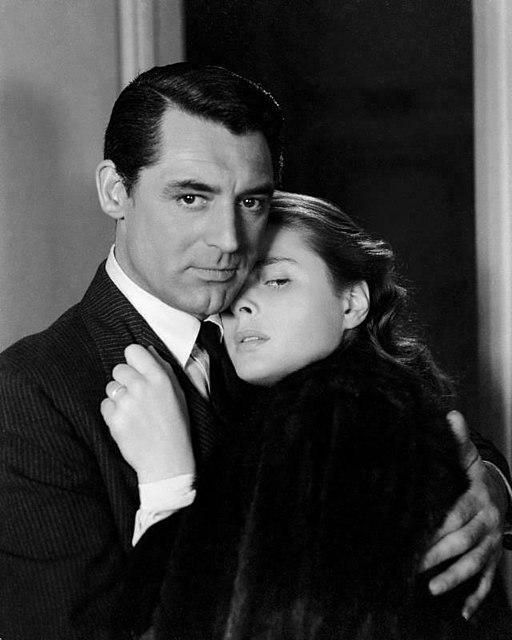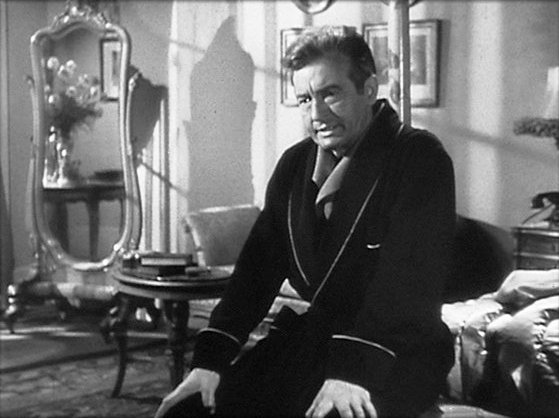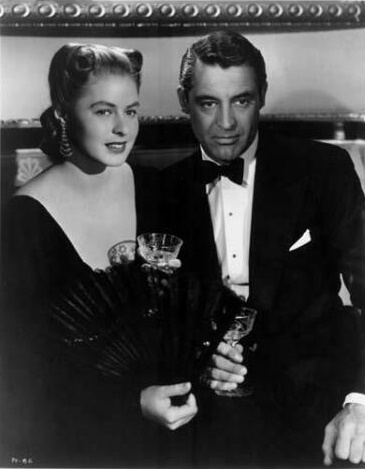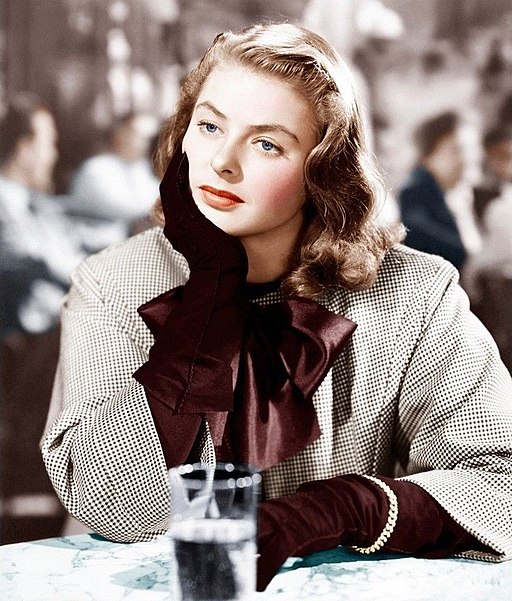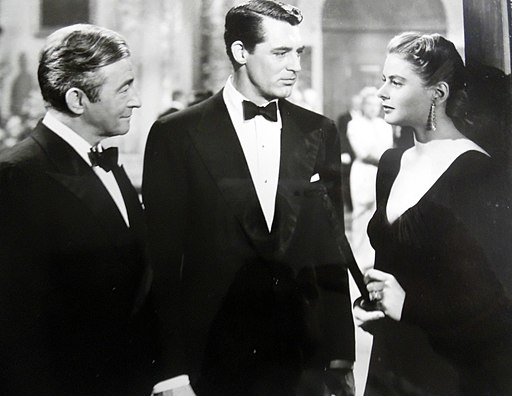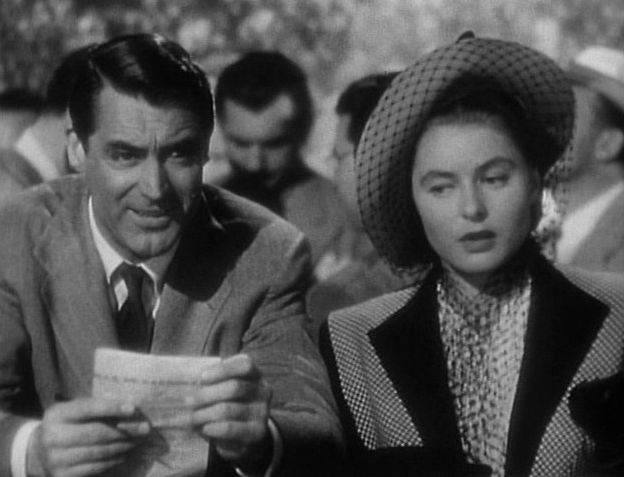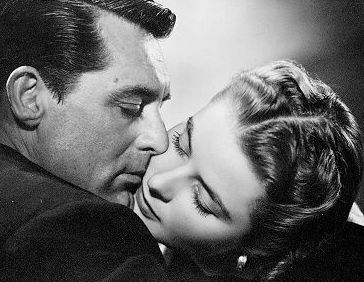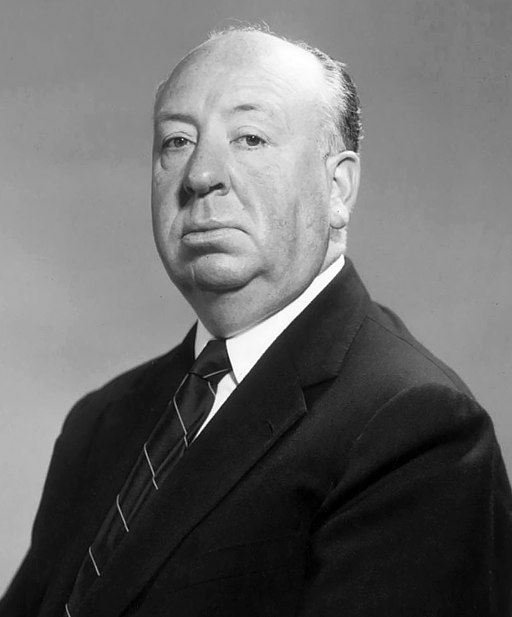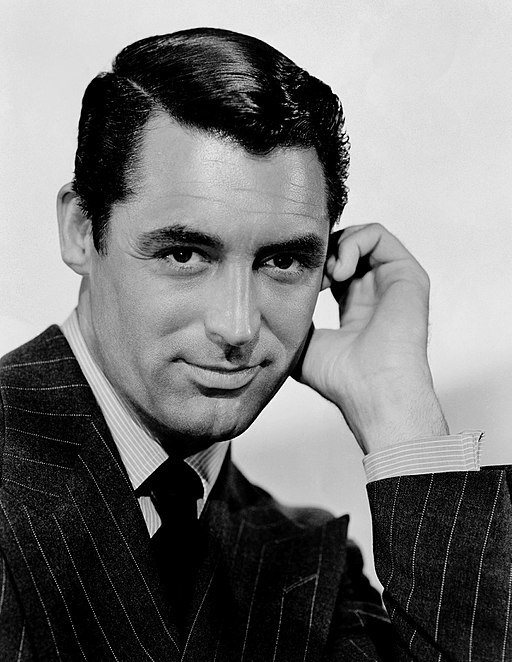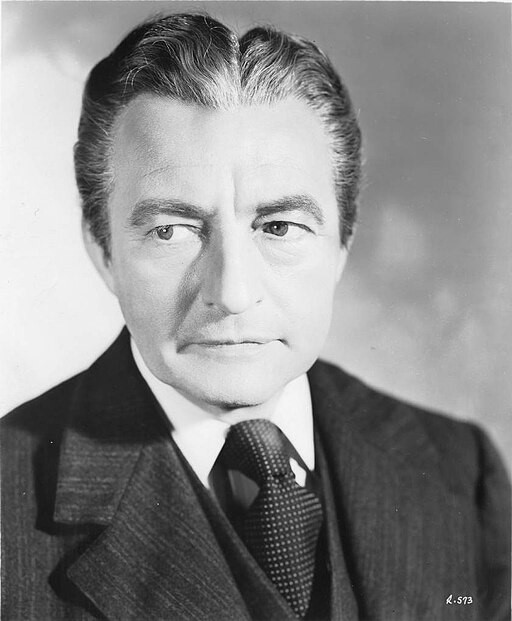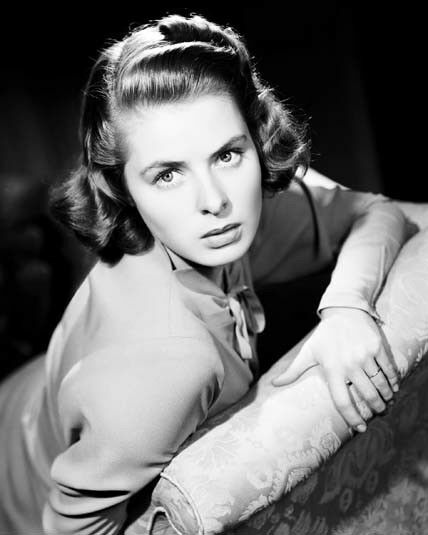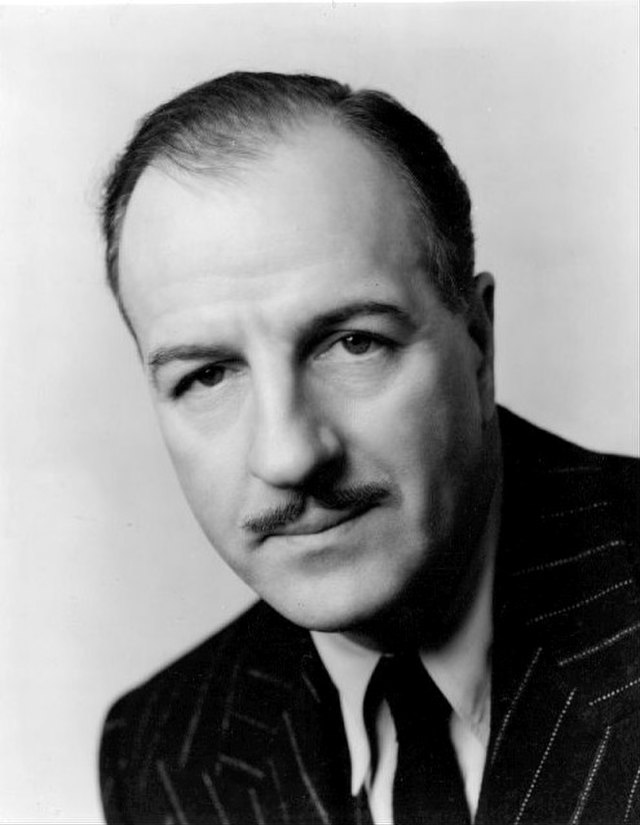Notorious - 1946
back| Released by | RKO Radio Pictures |
| Director | Alfred Hitchcock |
| Producer | Alfred Hitchcock (uncredited), David O. Selznick |
| Script | Ben Hecht |
| Cinematography | Ted Tetzlaff |
| Music by | Roy Webb |
| Running time | 101 minutes |
| Film budget | $2,000,000 (1946 USD) |
| Box office sales | $7,800,000 (worldwide gross) |
| Main cast | Cary Grant - Ingrid Bergman - Claude Rains - Leopoldine Konstantin |
Notorious
A captivating tale of espionage and romance
"Notorious" is renowned for its innovative cinematography, compelling storyline, and the strong performances of its lead actors. The film blends elements of romance, suspense, and espionage, typical of Hitchcock's style.
The dynamic between Cary Grant and Ingrid Bergman's characters, coupled with the tension arising from Claude Rains' role, creates a captivating narrative. The movie was both a critical and commercial success, further cementing Hitchcock's status as a master filmmaker.
Related
Notorious – 1946
Summary and Analysis
Notorious" (1946) is a masterful blend of suspense, romance, and espionage, and is considered one of Alfred Hitchcock's finest films. Here's a comprehensive summary and analysis:
Summary
Setting: Post-World War II
Plot:
- Introduction: The film opens with Alicia Huberman (Ingrid Bergman), the daughter of a convicted Nazi spy, being recruited by American agent T.R. Devlin (Cary Grant) to infiltrate a group of Nazis in Brazil.
- Rising Action: Alicia and Devlin's professional relationship turns personal, but their romance is complicated by the mission. Alicia is tasked with courting Alexander Sebastian (Claude Rains), a leading member of the Nazi group and a man who once harbored feelings for her.
- Climax: Alicia successfully infiltrates the group and marries Sebastian, uncovering a plot involving uranium ore (a nod to contemporary nuclear fears). Tensions mount as Sebastian slowly realizes Alicia's true motives, and her life is put in danger.
- Falling Action: Devlin, despite feeling betrayed by Alicia's actions, rescues her from the increasingly suspicious and hostile household of Sebastian.
- Resolution: The film ends with Devlin and Alicia leaving the Sebastian residence, while Alexander faces the grim reality of confronting his fellow Nazis with his failure.
Analysis
Themes:
- Love vs. Duty: The film intricately weaves the romance between Alicia and Devlin with their professional obligations, creating a tense narrative where personal and professional lines are blurred.
- Trust and Betrayal: The dynamics of trust, especially in espionage, are central. Alicia's struggle with her feelings for Devlin and her mission encapsulates this theme.
- Moral Ambiguity: Characters in "Notorious" are complex; there are no clear-cut heroes or villains. Alicia, for instance, is a deeply flawed character whose redemption arc is central to the story.
Cinematography and Style:
- Hitchcock's use of close-ups, especially in the famous kissing scene between Grant and Bergman, intensifies the emotional depth of the film.
- The cinematography, notably the crane shot that culminates in a close-up of Bergman's hand holding a key, is innovative and adds to the suspense.
Performances:
- Ingrid Bergman portrays Alicia as vulnerable yet resilient, delivering a nuanced performance.
- Cary Grant's Devlin is suave yet emotionally guarded, a departure from his usual lighter roles.
- Claude Rains as Alexander Sebastian offers a portrayal of a sympathetic antagonist, torn between love, jealousy, and loyalty to his cause.
Impact and Legacy:
- "Notorious" is celebrated for its narrative structure, visual storytelling, and thematic complexity.
- The film's blend of different genres set it apart from typical spy thrillers of its time and has influenced numerous films in the espionage genre.
Official Trailer "Notorious":
Full Cast of “Notorious”:
- Cary Grant as T.R. Devlin
- Ingrid Bergman as Alicia Huberman
- Claude Rains as Alexander Sebastian
- Leopoldine Konstantin as Madame Anna Sebastian
- Louis Calhern as Captain Paul Prescott
- Reinhold Schünzel as Dr. Anderson
- Moroni Olsen as Walter Beardsley
- Ivan Triesault as Eric Mathis
- Alexis Minotis as Joseph (credited as Alex Minotis)
- Wally Brown as Mr. Hopkins
- Charles Mendl as Commodore
- Ricardo Costa as Dr. Julio Barbosa
- E.A. Krumschmidt as Emil Hupka
- Fay Baker as Ethel
Analysis of the Direction of Alfred Hitchcock:
Alfred Hitchcock's direction in "Notorious" (1946) is a prime example of his masterful craftsmanship in film-making and a testament to his title as the "Master of Suspense." Here's an analysis of his direction in this classic film:
Visual Storytelling
- Innovative Camera Work: Hitchcock's use of camera angles and movements is iconic. The crane shot that descends from the second floor of the mansion to a close-up of Alicia's hand clutching the key is a notable example. This not only builds suspense but also tells the story visually, a hallmark of Hitchcock's style.
- Framing and Composition: Hitchcock's framing often contains symbolic elements. For example, the use of bars and shadows to suggest imprisonment or characters being trapped, reflecting their emotional or physical states.
Suspense and Tension
- Pacing: Hitchcock masterfully controls the pacing, balancing slower, more intimate scenes with moments of high tension. This controlled pacing keeps the audience engaged and heightens the suspense.
- Revelation of Information: He reveals just enough information to keep the audience guessing. By not showing everything, he allows the audience's imagination to fill in the gaps, often leading to heightened suspense.
Character Development
- Complex Characters: Hitchcock's characters in "Notorious" are multifaceted. They are not simply good or evil; their moral ambiguities make them more realistic and relatable. Hitchcock's direction brings out these complexities, particularly in the characters of Alicia and Devlin.
- Romantic Tension: The romance between Alicia and Devlin is laced with conflict and vulnerability, which Hitchcock captures through both the script and the actors' performances, accentuated by his direction.
Use of Themes and Motifs
- Motifs: Hitchcock uses recurring motifs, like the key and the wine bottle, as visual metaphors. These motifs are woven seamlessly into the narrative, adding depth to the story.
- Themes: Themes of trust, love, and betrayal are explored deeply. Hitchcock's direction ensures these themes are not just spoken but shown, often through subtle visual cues or the actors' performances.
Collaborative Approach
- Working with Actors: Hitchcock is known for his meticulous planning and demanding direction style. In "Notorious," he extracts profound and nuanced performances from his cast, especially from Ingrid Bergman and Cary Grant.
- Collaboration with Cinematographer and Composer: Hitchcock's collaboration with cinematographer Ted Tetzlaff and composer Roy Webb further enhances the film's mood and atmosphere. The cinematography and musical score are integral to creating the film's suspenseful ambiance.
Performance of Ingrid Bergman as Alicia Huberman:
Ingrid Bergman's portrayal of Alicia Huberman in Alfred Hitchcock's "Notorious" is a standout performance that adds depth and complexity to the film. Her role is pivotal to the narrative and is a significant example of her exceptional acting talent. Here's an analysis of her role:
Character Complexity
- Depth of Character: Alicia Huberman is not a straightforward heroine. She's a deeply flawed character with a troubled past, notably being the daughter of a convicted Nazi spy. Bergman imbues Alicia with a sense of vulnerability and strength, balancing her emotional turmoil with her courage.
- Transformation: Bergman’s Alicia undergoes a significant transformation throughout the film. Initially seen as somewhat reckless and disillusioned, she evolves into a courageous operative, displaying resilience and resourcefulness.
Emotional Range
- Romantic and Emotional Conflict: Bergman skillfully portrays the emotional conflict within Alicia, especially in her turbulent relationship with Devlin (Cary Grant). Her performance captures the nuances of a woman torn between love and duty, conveying both the romance and the tension in her relationship.
- Internal Struggle: Bergman excels in scenes where she must convey complex emotions without dialogue. Her facial expressions and body language communicate Alicia's internal struggles, making her character's journey more impactful.
Chemistry with Co-stars
- Interaction with Cary Grant: The chemistry between Bergman and Grant is palpable. Bergman’s portrayal of vulnerability complements Grant’s more reserved, stoic performance. Their on-screen relationship is central to the film’s emotional core.
- Dynamics with Claude Rains: As Alicia, Bergman convincingly portrays a woman manipulating Alexander Sebastian (Claude Rains) while also eliciting a degree of sympathy for him. Her interactions with Rains highlight Alicia's internal conflict between her mission and her emotions.
Role in the Narrative
- Driving the Plot: Alicia is not just a passive character; her decisions and actions drive the plot forward. Bergman’s performance ensures that Alicia's journey from a reluctant participant to a committed spy is believable and engaging.
- Symbol of Vulnerability and Strength: Through Bergman's performance, Alicia represents the duality of vulnerability and strength. She is vulnerable due to her past and her feelings for Devlin, yet she displays remarkable strength in facing danger and moral dilemmas.
Hitchcock's Direction
- Hitchcock's Muse: Bergman was one of Hitchcock's favorite actresses, and in "Notorious," he directs her in a way that brings out the subtleties and complexities of her character. Hitchcock uses Bergman’s screen presence to enhance the film's suspense and emotional depth.
Memorable Quotes from “Notorious”:
Alicia Huberman (Ingrid Bergman): "Dry your eyes, baby; it's out of character."
- Context: Alicia says this to herself in the mirror, showcasing her attempt to stay strong in a moment of vulnerability.
T.R. Devlin (Cary Grant): "I'm very sorry you all have to go. It has been a perfectly hideous party."
- Context: Devlin's dry wit is evident in this line, reflecting his character's cool, collected demeanor.
Alexander Sebastian (Claude Rains): "I am married to an American agent."
- Context: This is a pivotal moment in the film where Sebastian realizes Alicia's true identity, highlighting the central theme of deception.
Alicia: "This is a very strange love affair." Devlin: "Why?" Alicia: "Maybe the fact that you don't love me."
- Context: This exchange between Alicia and Devlin underscores the complex and tense nature of their relationship.
Devlin: "I don't know how much of this is real and how much is a job."
- Context: Devlin expresses his uncertainty about the nature of his relationship with Alicia, reflecting the theme of trust and betrayal.
Alicia: "You can add Sebastian's name to my list of playmates."
- Context: Alicia's line here reflects her internal conflict and the moral ambiguity of her situation as a spy.
Madame Sebastian (Leopoldine Konstantin): "We are protected by the enormity of your stupidity, for a time."
- Context: Madame Sebastian says this to her son, Alexander, in a moment of frustration, revealing the cold and calculating nature of their characters.
Devlin: "I thought you had forgotten about those." Alicia: "No, I just didn't want to wear them anymore."
- Context: This conversation about Alicia's father's cufflinks reflects the complexities of her past and her attempts to move forward.
Significance of the Magnificent Script by Ben Hecht:
Ben Hecht's script for "Notorious" (1946) is a critical element in the film's success and enduring legacy, showcasing his talent as a screenwriter and contributing significantly to the film's impact. Here's an analysis of the importance of Hecht's script:
Masterful Storytelling
- Intricate Plot: Hecht's script weaves a complex narrative that balances elements of romance, suspense, and espionage. The plot is sophisticated yet accessible, drawing viewers into its intricate web of intrigue.
- Character Depth: Hecht crafts multi-dimensional characters, each with their own motivations, vulnerabilities, and flaws. This depth makes the characters, especially Alicia and Devlin, more relatable and intriguing.
Nuanced Dialogue
- Subtlety and Wit: Hecht's dialogue is known for its subtlety and wit. The script delivers lines that are both memorable and laden with double meanings, enhancing the film's suspense and emotional depth.
- Character Development: The dialogue is a key tool in developing the characters. Through their conversations, we learn about their pasts, their fears, and their desires, which are crucial in driving the narrative forward.
Thematic Richness
- Moral Ambiguity: Hecht's script delves into themes of trust, betrayal, and moral ambiguity. These themes are expertly woven into the narrative, making the film not just a suspense thriller but also a study of human nature.
- Political Undertones: Set in the post-World War II context, the script subtly touches on the political climate of the time, adding a layer of historical relevance to the story.
Collaboration with Hitchcock
- Synergy with Direction: Hecht's script complements Hitchcock's direction seamlessly. The suspense and tension inherent in the script are amplified by Hitchcock's visual storytelling, creating a cohesive and compelling film.
- Foundation for Visuals: The script provides a solid foundation for Hitchcock's innovative cinematographic techniques. Key scenes, like the famous crane shot, are grounded in the strong narrative structure established by the script.
Influence and Legacy
- Genre Influence: Hecht's script for "Notorious" has influenced the espionage and thriller genres. Its combination of romance, intrigue, and moral complexity set a new standard for such narratives.
- Enduring Appeal: The quality of Hecht's writing contributes to the film's lasting appeal. "Notorious" continues to be studied and admired for its script, long after its release.
In summary, Ben Hecht's script is a cornerstone of "Notorious," integral to its success and enduring status as a classic. His ability to blend complex characters, witty dialogue, and a suspenseful narrative creates a rich and engaging film experience.
Awards and Recognitions:
Academy Awards (Oscars)
- Nominated: Best Supporting Actor - Claude Rains
- Nominated: Best Writing, Original Screenplay - Ben Hecht
Despite its limited number of nominations and lack of wins at the Oscars, "Notorious" is often regarded as one of Hitchcock's finest works. Its influence on the thriller genre and its enduring appeal to audiences and critics alike have solidified its status as a classic in cinema history.
Other Honors and Legacy
- National Film Registry: In 2006, "Notorious" was selected for preservation in the United States National Film Registry by the Library of Congress as being "culturally, historically, or aesthetically significant."
- Critical Acclaim: The film has consistently been ranked highly in various critical lists and retrospectives of Hitchcock's career and the thriller genre.

